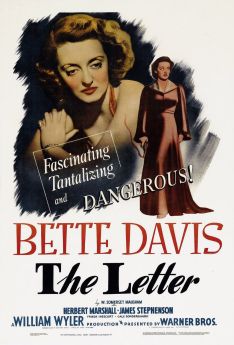 In the opening scene of William Wyler’s The Letter (1940), Leslie Crosbie (Bette Davis) murders the man she was having an affair with. The film reveals three reasons why women cheat on their husbands: boredom, loneliness, and an emotional connection with a male friend.
In the opening scene of William Wyler’s The Letter (1940), Leslie Crosbie (Bette Davis) murders the man she was having an affair with. The film reveals three reasons why women cheat on their husbands: boredom, loneliness, and an emotional connection with a male friend.
In research by Allen et. al, “boredom in the marriage”1 was cited as one reason why men and women were unfaithful to their spouses. One factor in Leslie’s unfaithfulness is boredom. Throughout the film, she is seen doing lacework. She finds the activity “soothing”, and took it up because she “had nothing else to do.” Although she has been married for 10 years, she has no children, and does not work outside the home. Even in her own home she has little to do. She says, “the boys take such good care of us.” Leslie has no major responsibilities as a housewife. An affair brought excitement to her life.
Another factor in Leslie’s unfaithfulness is loneliness. As the manager of a rubber plantation, her husband Robert (Herbert Marshall) works long hours, and is sometimes away on business for “a day or two.” Leslie accepts the reality of her husband’s absence, saying “I never mind being alone. A planter’s wife gets used to that.” However, the reason Leslie is “used to” being alone is that she has been cheating on Robert for many years. With an absent husband, she felt lonely, and her affair filled that emotional void.
While it is more common for men to have an affair due to physical attraction, women are more likely to be in love with the man they have an affair with. According to Spanier and Margolis, “Women report a significantly greater emotional involvement with their extramarital partners than men.”2 In their research, 51% of the men and 72% of the women reported that they “had some emotional commitment” or it was a “long-term love relationship.”3 Leslie confesses to Robert that she has been “in love for years.” Her extra-marital relationship began as a friendship seven years prior, but at some point she fell in love, and it became a sexual relationship.
A central theme in The Letter is that a married woman who is idle and has an absent husband is more likely to cheat. Robert loved Leslie, provided for her, and gave her everything that she needed, but she was bored, lonely, and had no goals or dreams of her own. With no children to care for and no job, she turned to another man to find meaning in her life. Then, when her lover suddenly abandoned her, she murdered him.
Notes
- Elizabeth S. Allen et al., “Intrapersonal, Interpersonal, and Contextual Factors in Engaging in and Responding to Extramarital Involvement.” Clinical Psychology: Science & Practice 12, no. 2 (June 2005): 109.
- Graham B. Spanier and Randie L. Margolis, “Marital Separation and Extramarital Sexual Behavior.” The Journal of Sex Research 19, no. 1 (February 1983): 23, http://www.jstor.org/stable/3812417
- Spanier and Margolis, “Marital Separation and Extramarital Sexual Behavior,” 36.
A good analysis of the marriage in this film and Leslie’s motivation, too.
Bette Davis’ character is a smart, smart woman, and it was dangerous to emotionally abandon her.
LikeLiked by 1 person
Well-done! Succinct writing!! –Paul
LikeLiked by 1 person
“Robert loved Leslie, provided for her, and gave her everything that she needed, but she was bored, lonely, and had no goals or dreams of her own.”
It could be argued that by being absent and leaving his wife lonely, the husband was not providing everything she needed. Just a thought.
-Anderson Ryle
LikeLiked by 1 person